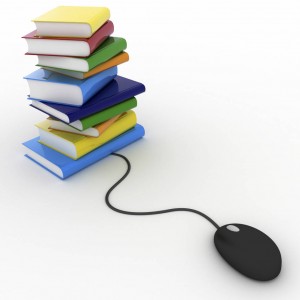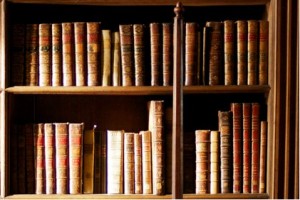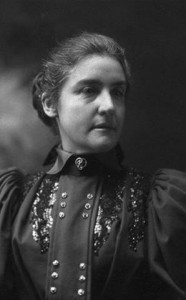
M. Carey Thomas, Bryn Mawr College’s first female president, is the subject of a new digital exhibit to be launched soon
I have been exploring my thoughts on women’s history, digital humanities, and feminism through two separate presentations in recent months, the first at the conference organized by The Albert M. Greenfield Digital Center for the History of Women’s Education, Women’s History in the Digital World (March 2013), and the second at the Five Colleges Mediating Public Spheres: Genealogies of Feminist Knowledge in the Digital Age conference (April 2013). In a presentation at the latter conference, titled Open Source Technology and Feminist Perspectives: Translating Sources on the History of Women’s Education to the Digital Age I explained my feminist approach to my work at the Digital Center, focusing on a digital exhibit on M. Carey Thomas that is underway and will be launched soon. This blog post represents a synthesis of the two papers, based on work and thoughts in progress… all comments and feedback welcome as I work through some of the concepts I’ve been grappling with.
My thoughts on the trifecta of feminism, digital humanities and women’s history are largely drawn from my experiences using the open source software platform, Omeka, and our institutional enterprise version of Word Press to populate different areas of the Digital Center’s site, in addition to my training as a CLIR Postdoctoral Fellow. While I assume that neither of these tools were designed with feminist notions in mind, I’ve come to believe that they have large potential to be utilized for feminist outcomes, particularly Omeka, as I will explain further in this post. Primarily, the Center’s site aims to tell stories in the history of women’s education that emanate from different perspectives. As Hermione Lee has said in her collection Virginia Woolf’s Nose: Essays on Biography, “We all want stories”, and the demand for such stories in the digital age is no less (possibly more, in fact) than ever before.[1]
The digital age and the tools it provides allow for a different mediation of knowledge than standard forms of scholarly communications. As noted by Abby Smith Rumsey these new methods have brought “fundamental operational changes and epistemological challenges [that] generate new possibilities for analysis, presentation, and reach into new audiences”.[2] The exhibit format in Omeka is designed to allow for the easy presentation of original historical material, such as images, transcriptions and audio files. This allows for the greater sharing of primary source materials, itself a way to decolonize and break down barriers to research and access to rare materials. We have created a number of exhibitions on our site, some of which have been generated as a result of student work from a class I teach on the history of women’s education, some of which come from collaborations with other colleges, and some drawn from our own collections and created by me and my team (see here for the full range of exhibits we have developed so far).
Our endeavor to produce digital source material comes from a desire to transmit knowledge and awareness of women’s history to the broadest audience possible: fellow researchers, students, teachers, alumnae, digital humanists and those simply with a desire to learn more about the topic–in essence, the public sphere has expanded in the digital age, although there are still challenges to be faced in greater online access morphing into another form of the ‘digital divide’.
Upon learning the new software platform and becoming familiar with its characteristics, possibilities and constraints, I realized that the Omeka exhibit format allows for the subject matter to be presented in a deconstructed narrative, due to the free form it provides for creating the digital exhibit. This struck me as having strong feminist potential: while the structure allowed by the Omeka format is cohesive in terms of form and flow, the sectioning of a biographical narrative allows for the fragmentation of the story, and in my efforts, for the development of a kaleidoscopic view, or, to paraphrase Henry James, to let the “swarm of possibilities” that nebulously make up a person’s biography to emerge, rather than a “few estimated and cherished things”.[3] This is, in my view, one of the pivotal means by which to incorporate digital media in feminist scholarship and practice.
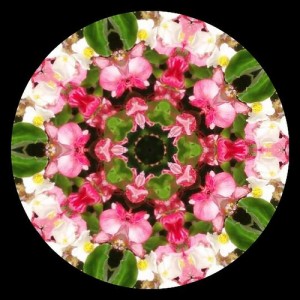
Image by klmontgomery licensed under a Creative Commons license and available here http://www.flickr.com/photos/klm_digital_snaps/1444968874/sizes/m/in/photostream/
In a feminist postmodern tradition, this approach posits that there is no ONE person for us to study, no One Truth we can ascribe to a person or their life history. In this case, M. Carey Thomas, born in Baltimore, Maryland on January 2, 1857 to a prominent Quaker family. Thomas was the first Dean and later the first female President of Bryn Mawr College and a national leader in women’s struggle for access to higher education and the suffrage movement. My feminist approach to her biography aims to be cognizant of the privilege in stories such as hers: the history of women’s entry into higher education is an elite history, and recognition of this is necessary so that the histories we tell are not merely celebratory without being interrogative.
Here I am focusing on Thomas as she was seen from different perspectives: her own (for example, her ambitious articulations for her education and career in the letters and diaries that span her time at Quaker boarding school, on to Cornell, Johns Hopkins and eventually a summa cum laude PhD from the University of Zurich), those of her contemporaries, lovers, friends and family, the public and the way in which she was memorialized after her death in 1935. I am focused here, however, not on the details of her biography (although this will be in the exhibit) but rather on examining the potential of an open source software tool to present critical historical analysis of this fascinating person. The ability to juxtapose different opinions by placing them on the same page is more visually and comprehensively impactful in a digital exhibition format than would be the effect of a written paragraph: in traditional biographical accounts such as an article or monograph, editorial and stylistic conventions would view such jumping around as incoherent, and yet it can be seamless in an online presentation.
Making sure our metadata is harvested by the major search engines and databases and using social media to reach both scholarly and public audiences will both be crucial in building up a new body of feminist genealogies and for tracing feminist work in the digital era. The metadata itself also needs to be cognizant of feminist principles in describing women’s identities in digital databases, as was mentioned by Professor Laura Mandell in her keynote speech at the Women’s History in the Digital World conference.
It is also imperative that as we do work that mediates the public sphere in the digital age we think about its long term preservation. This requires that choices be made, funding be sourced and policies be formulated now – it would be the greatest tragedy of all if we found ourselves unable to trace back the exciting developments in feminist work that have been produced in online public spaces. The familiar academic mantra of ‘publish or perish’ might be usefully adapted in this context to be ‘archive or perish’. And, as I remarked at the Women’s History in the Digital World conference that was held at Bryn Mawr College, I believe fundamentally in the idea that the ‘add women and stir model’ for any kind of initiative, social, political education or anything else, rarely works.
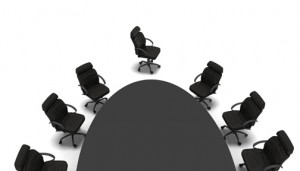
Photo courtesy: www.hbdi.com
In the new era of digital humanities, women need a seat at the table while it’s still being set, not after the main course has been served. As I researched for this paper, I discovered that others in the digital humanities community have also used the “table” to describe the need to collaborate, critique and engage in new developments. Alan Liu has argued that digital humanists need to be equal partners at the table, not just a servant, when critical conversations are happening about the way forward for the humanities and cautions that digital humanists need to include more cultural critique in their work.[5] Moya Bailey extends Liu’s concerns into more explicitly feminist territory with her arguments that the “ways in which identities inform both theory and practice in digital humanities have been largely overlooked” and that moving from “the margin to the center” gives the opportunity to “engage new sets of theoretical questions that expose explicit structural limitations that are the inevitable result of an unexamined identity politics of whiteness, masculinity and ablebodiness”.[6] Alan Liu’s point was that the “digital humanities have a special role to play today in helping the humanities communicate in contemporary media networks”.[7] I would extend this argument to say that feminists have a special role in mediating the present and future public spheres, through their research, pedagogy and activism. Here the words of M. Carey Thomas are apt: reflecting on the success women had made of educational attainment in the first twenty-five years of the Association of Collegiate Alumnae, she stated “The fearsome toads of those early prophecies are turning into pearls of purest radiance before our very eyes.”[8] Let’s hope it’s the same for us as we feminists navigate the new public spheres and create our own genealogies of knowledge.
[1][1] Hermione Lee, Virginia Woolf’s Nose: Essays on Biography, Princeton University Press: Princeton, 2005: 1.
[2] Smith Rumsey , New-Model Scholarly Communication: Road Map for Change (2011: 2).
[3] As quoted in Hermione Lee, Virginia Woolf’s Nose: Essays on Biography, Princeton University Press: Princeton, 2005: 1.
[4] Anne Balsamo, Designing Culture: The Technological Imagination at Work, Duke University Press: 2011: 51.
[7] Alan Liu, ‘Where is Cultural Criticsim’.
[8] Thomas, Women’s College and University Education: Address delivered at Quarter-Centennial Meeting of the Association of Collegiate Alumnae, Boston, November 6, 1907.
Available in digital form on the website of The Albert M. Greenfield Digital Center for the History of Women’s Education by clicking here. You can view the original by visiting Special Collections, Bryn Mawr College.
